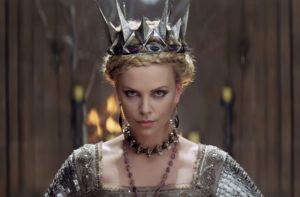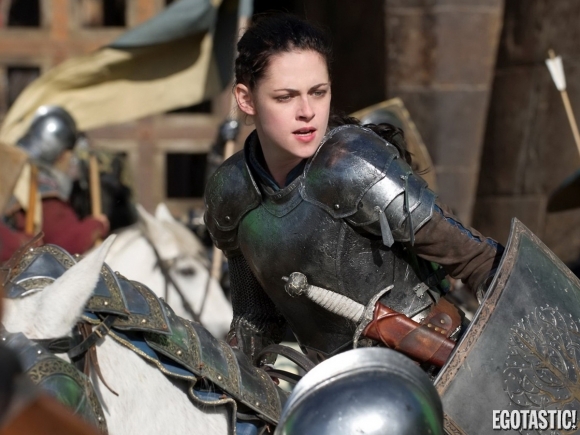My favorite scene in 1991’s “Robin Hood: Prince of Thieves” involves Azeem, played by Morgan Freeman, standing atop a castle ledge, rallying a country of starving and oppressed people to rise against the evil Sheriff. The entire movie builds up to this. From the peasants’ struggle to survive, to the heinous crimes Nottingham commits against them without a second thought, that moment holds all the anger, frustration, and bravery of a scared-schoolboy punching a cocky bully square in the face.
Powerful as that moment was, it occurred to me that it’s been far too long since a movie had lived up to the energy of this moment, or held its same rebellious spirit. However, watching the recently released “Snow White and the Huntsman,” I was reminded of what a movie looks like that invests its audience fully in its heroes’ struggle and then triumphantly gives their oppressors the middle finger.
“Snow White,” in this iteration, is played by Kristen Stewart, of “Twilight” fame. However, a good part of the beginning is devoted to showing young Snow White (Raffey Cassidy) growing up with her father, King Magnus (Noah Huntley, “28 Days Later”) and his wife. It is a happy life, and Snow is considered to be a beautiful and joyous blessing. However, the Queen’s untimely death leads the King to suffer depression, and his kingdom comes under attack. While he and his army are able to thwart this attempt, it is on the battlefield that the King discovers what will ultimately become his undoing – the beautiful Ravenna (Charlize Theron, “Reindeer Games”) destined to become the Mirror-worshiping Evil Queen.
Ravenna’s conquest of the Kingdom comes quickly, and without much exposition. However, instead of a mere plot point, these scenes stand out due to Theron’s remarkable ability to bring life to the evil Queen. Her viciousness is unparalleled, as are her sudden shifts. One moment she is murdering a peasant mercilessly, the next she is bonding with her brother (Sam Spruell) with what could be considered love. Theron’s portrayal is brutal and methodical. However, news quickly springs Ravenna into action: she learns from the “Mirror” that she must consume imprisoned Snow White’s beating heart to stay young forever, without the need to resort to witchery and murder to sustain her fading youth.

The movie picks up as Snow White escapes from the castle, seeking refuge in the Dark Woods (which Ravenna, and everyone else seems to fear ubiquitously. For example, as Ravenna compels the Huntsman (Chris Hemsworth, “Thor”) to fetch her lost prisoner from the Woods, he utters in response “He is dead.” When Ravenna corrects him, informing him it is a woman, his response is equally comical. “She is certainly dead.”
“Snow White and the Huntsman” works as a serious film thanks to the serious treatment that its actors, and its Director, Rupert Sanders, gives it. This year’s earlier take on the Snow White legend, “Mirror Mirror” was visually inspiring, but lacked in plot progression and pace. And while Tarsem Singh’s excellent eye for set pieces made that movie stand out, in “Huntsman” Sanders (in his feature film directorial debut) takes it a step further. The visuals of the Dark Woods are rightfully bleak, and later depictions of the woods that the Dwarfs inhabit are rendered with well-managed and believable CGI. Sprites, living fungus, and a host of magnificent animals line the inhabitants of this wonderland. And it works. So much detail is placed on realism in movies (both visually and aesthetically) that we sometimes forget movies are escapist. If a director can paint a fantasy world in splendid detail, why not do so? Sanders understands this. Older renditions of fairy tales would have killed for the cinematic tools available today.
Set pieces aside, the movie works thanks to the acting of Stewart, and her chemistry with Hemsworth’s Huntsman. Here Hemsworth once again takes a role that had the potential to ooze machismo, and tone it down into a likeable, real character. While he is not given a terrible amount of development, it isn’t really needed. He’s a hero, albeit an unlikely one, and gains our respect from the start.
 Likewise, Stewart takes a fabled character and adds a real layer of believability. In “Mirror Mirror,” Snow White accepts her mantle of responsibility a little too quickly, and without much protest. However for much of “Hunstman” Stewart’s Snow White is ambivalent and unsure. She is running for her life, aided by only a gruff man who was initially sent to kill her, and comes to accept her destiny slowly. For instance, in a scene where she rallies a group of townsfolk to her cause, she appears legitimately shocked when they follow her. It’s right to feel this way; she’s not Alexander the Great, she’s a frightened girl who others look to for answers she doesn’t feel she has. It’s also a credit to the Huntsman that he understands this person she has become – communicated with nothing more than a look.
Likewise, Stewart takes a fabled character and adds a real layer of believability. In “Mirror Mirror,” Snow White accepts her mantle of responsibility a little too quickly, and without much protest. However for much of “Hunstman” Stewart’s Snow White is ambivalent and unsure. She is running for her life, aided by only a gruff man who was initially sent to kill her, and comes to accept her destiny slowly. For instance, in a scene where she rallies a group of townsfolk to her cause, she appears legitimately shocked when they follow her. It’s right to feel this way; she’s not Alexander the Great, she’s a frightened girl who others look to for answers she doesn’t feel she has. It’s also a credit to the Huntsman that he understands this person she has become – communicated with nothing more than a look.
Another thing I was glad for was the realism the movie also offered the “Dwarfs.” I feared a comical representation, and was pleased to see a group of struggling people, albeit short, who had no love for the Queen and who reluctantly follow Snow White as she begins to face her destiny.
The dwarfs also serve another purpose. A more serious rendition of the “Snow White” legend, the script demands that no romance exist between Snow White and the Huntsman. However, these lovable creatures show, subtlety, the growing affection for Snow White by this sorrowful warrior. From a playful dance with one dwarf, to their realization that Snow holds some mysterious, life giving power, the Huntsman’s affection for her is shown through her effect on the world around her. And while this makes his heroic deeds to protect her one-sided, it plays more realistically. Do you really have time to fall in love when you’re fighting for your life?

“Snow White and the Hunstman” delivers in odd ways. If you have expectations, you might be disappointed, but not by the direction, pace, look, and feel that the movie has to offer. This movie is not “Twilight.” It offers a mournful but hopeful look at the Kingdom under the Queen’s clutches, and offers vindication in unlikely places. You’ll root for Snow White, root for the Huntsman, and be swept up with the action. The ending is as taut and rewarding as you could hope, while at the same time not suffering from over-the-top theatrics. It’s not a happily-ever-after, but it’s real. Do yourself a favor and see “Snow White and the Huntsman” – you’re not likely to be disappointed.
As a side note, both Stewart and co-star Robert Pattison often get a bad rap for “Twilight,” albeit unjustly. Their acting is criticized, especially Stewart’s, when the fault really lies in a humdrum script. After all, it’s a sci-fi romance drama based on a book written for teenagers. With the exception of “New Moon” Stewart was relegated to the role of the doting girlfriend of a vampire for the entire “Twilight” series, with little-to-no-room for character development. Her minimal role in the 2007 film “Into the Wild” didn’t really give her much chance to shine either, though her role in “The Runaways,” playing Joan Jett, may have shown more potential. “Snow White and the Huntsman” is really her first role as an adult where she is not draped in the shadows of bigger actors or one-sided plots. Time will tell what caliber of actress she develops into, but a slew of news media and blog country “Critics” do her a disservice with a character assassination based on what barely constitutes the start of her career.
It’s akin to pillorying Heath Ledger for “10 Things I Hate About You” when he still had “The Dark Knight” inside him just waiting to come out.
– by Mark Ziobro


